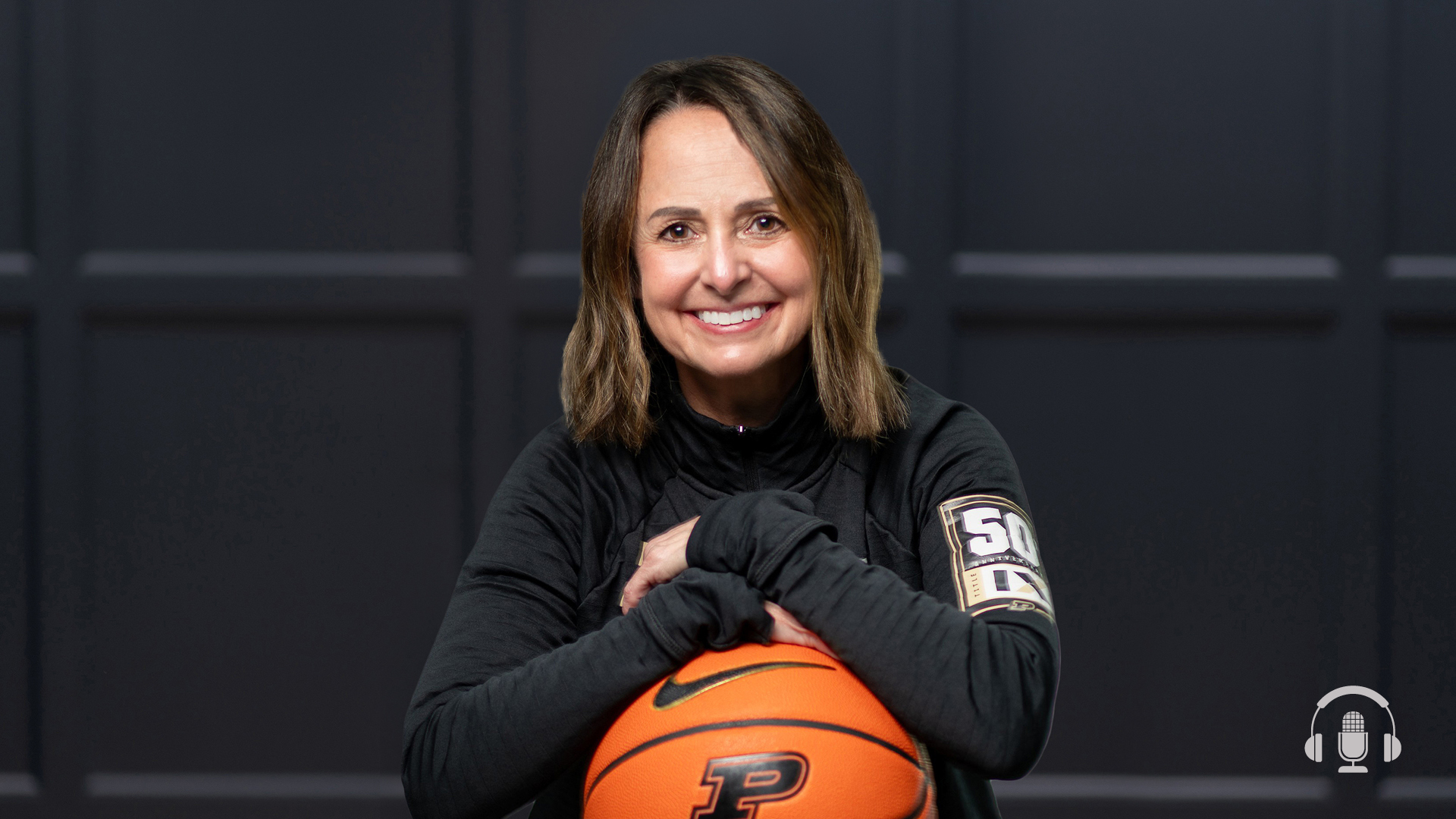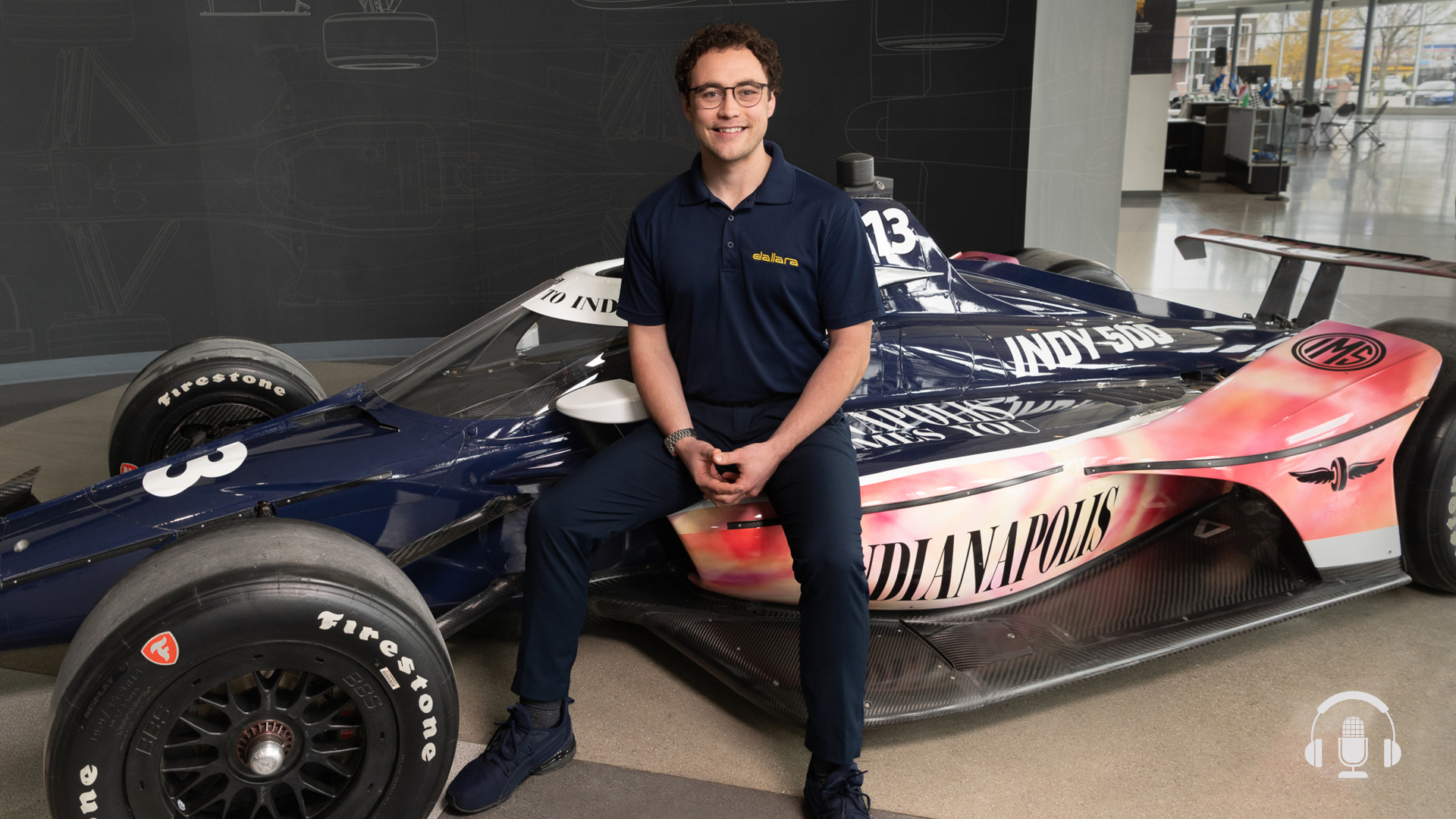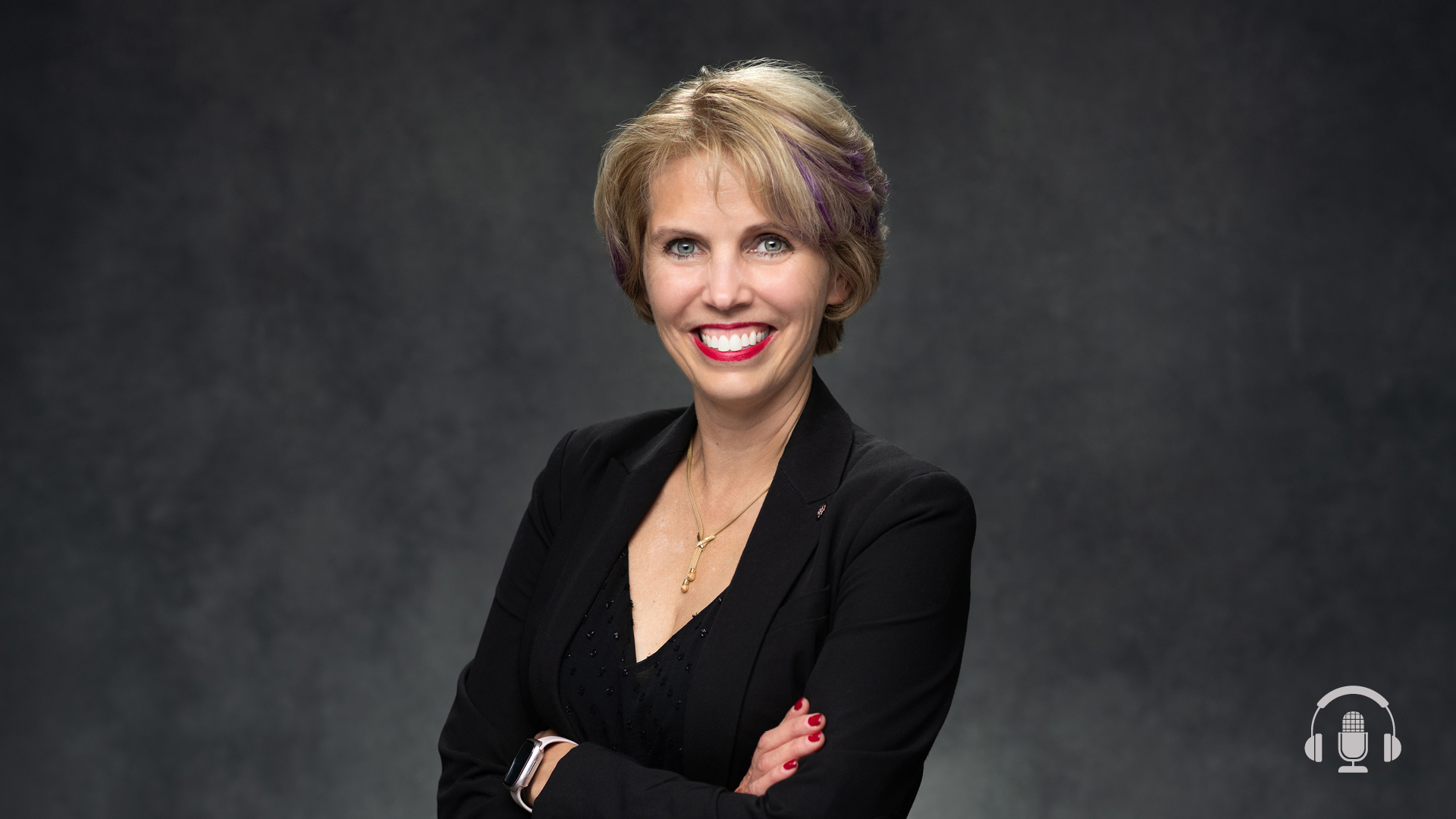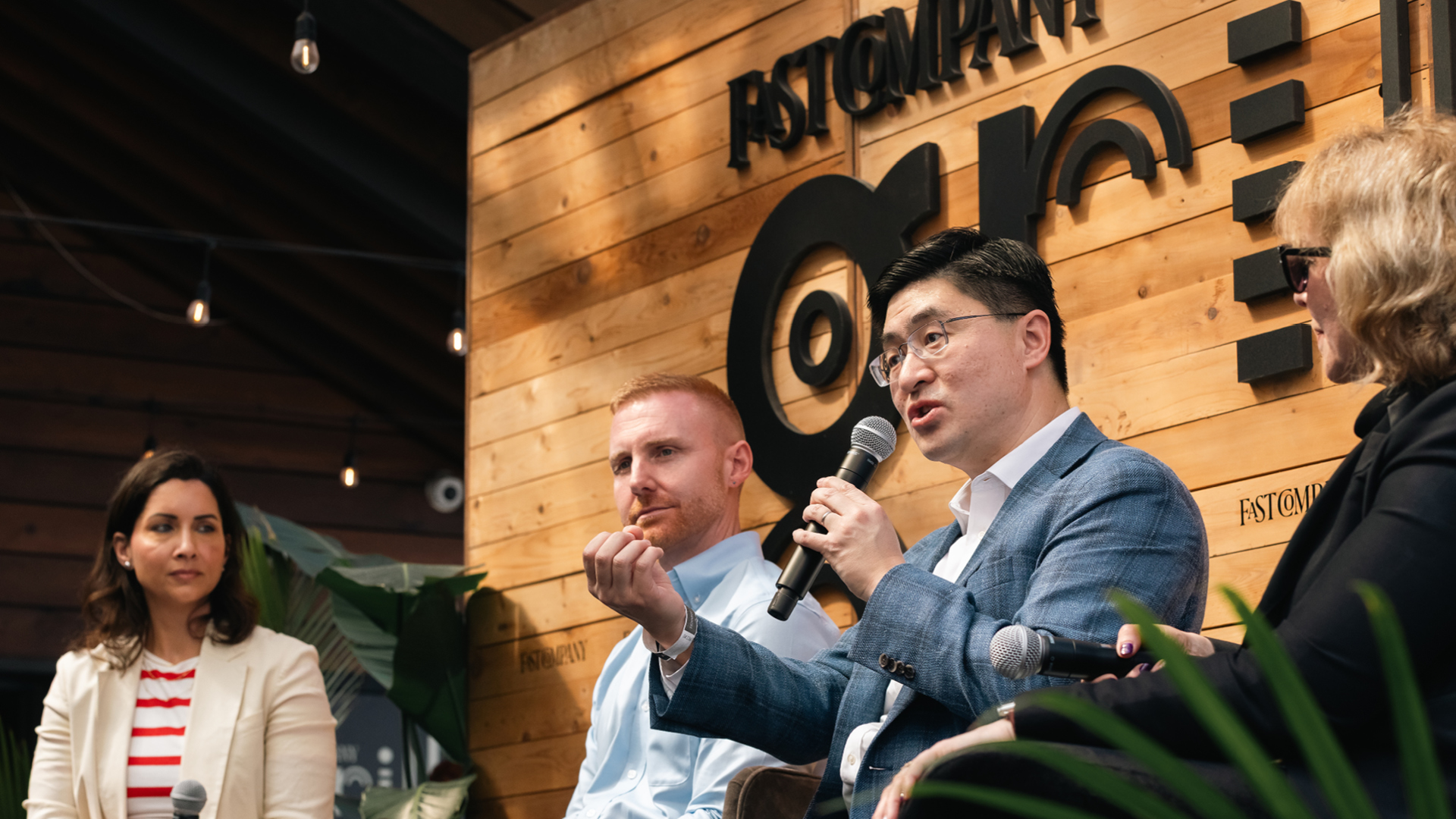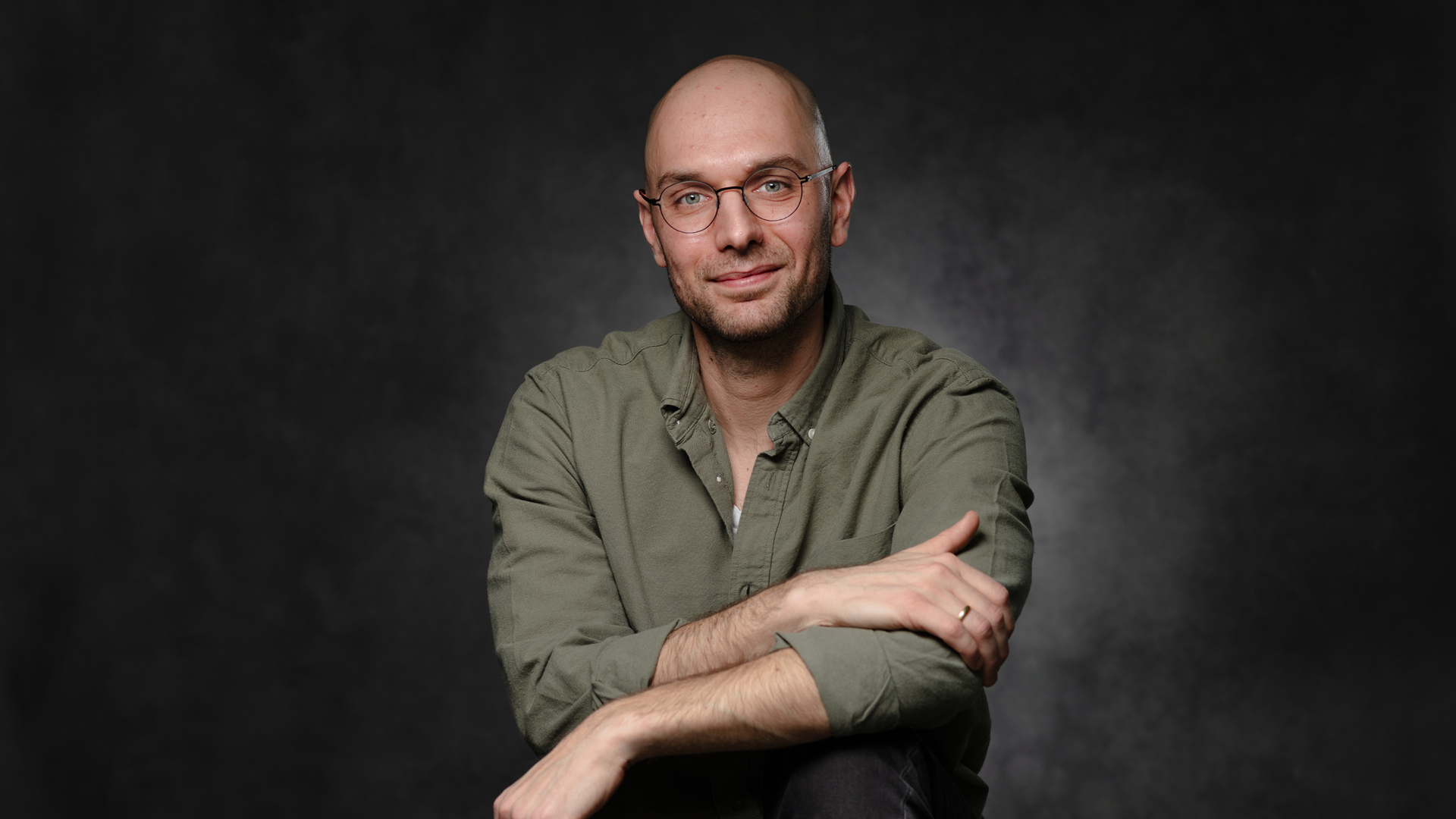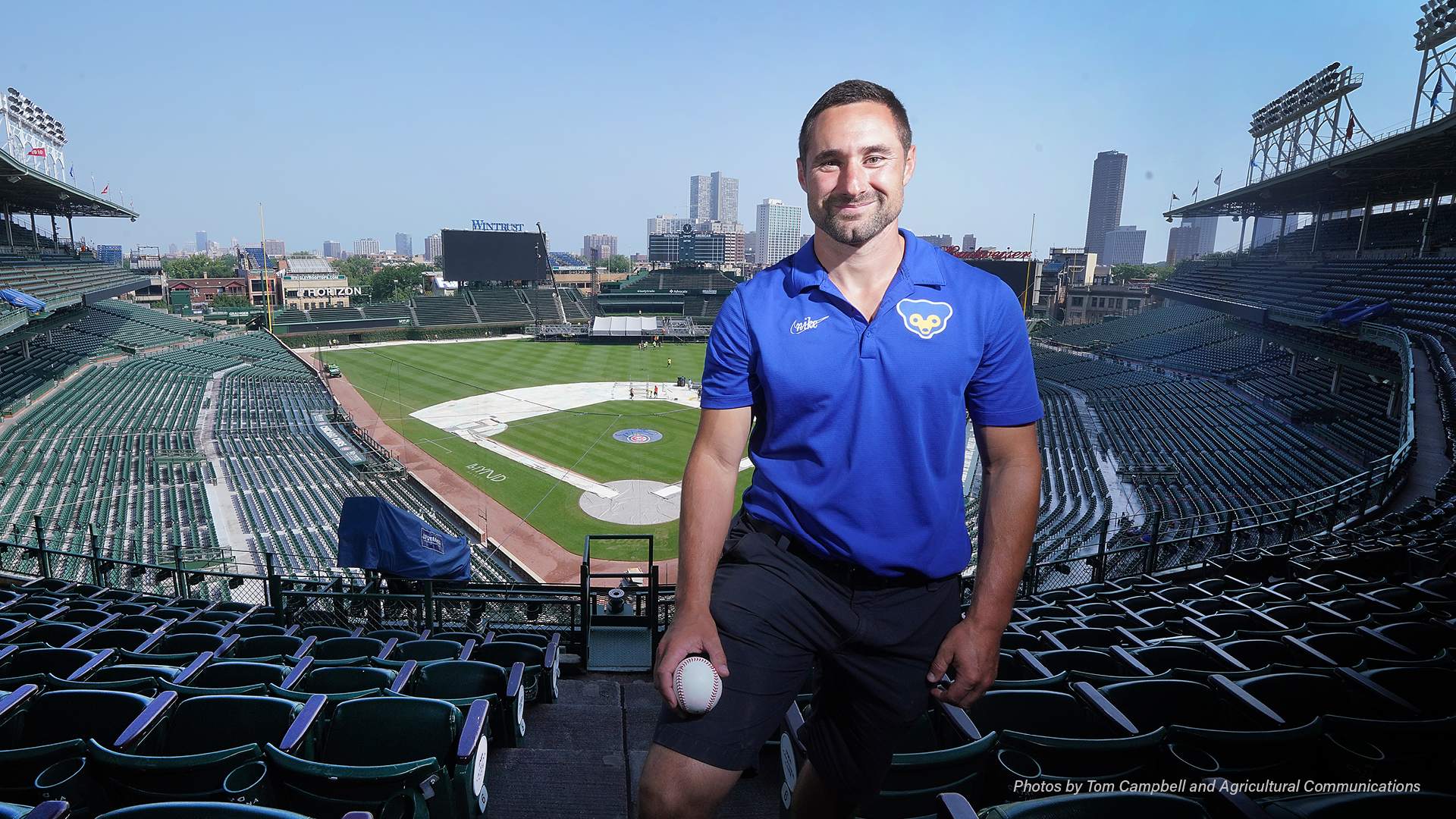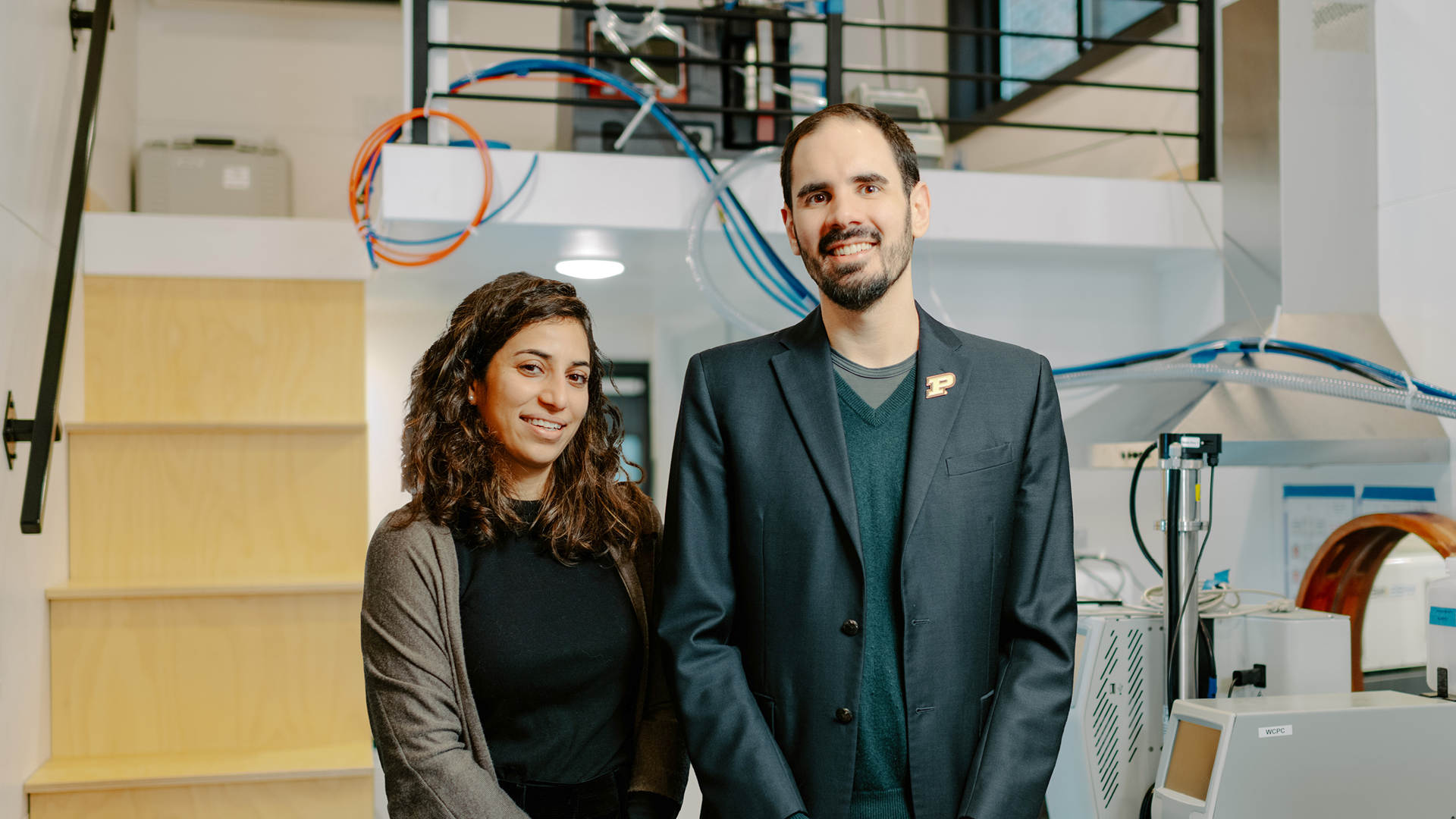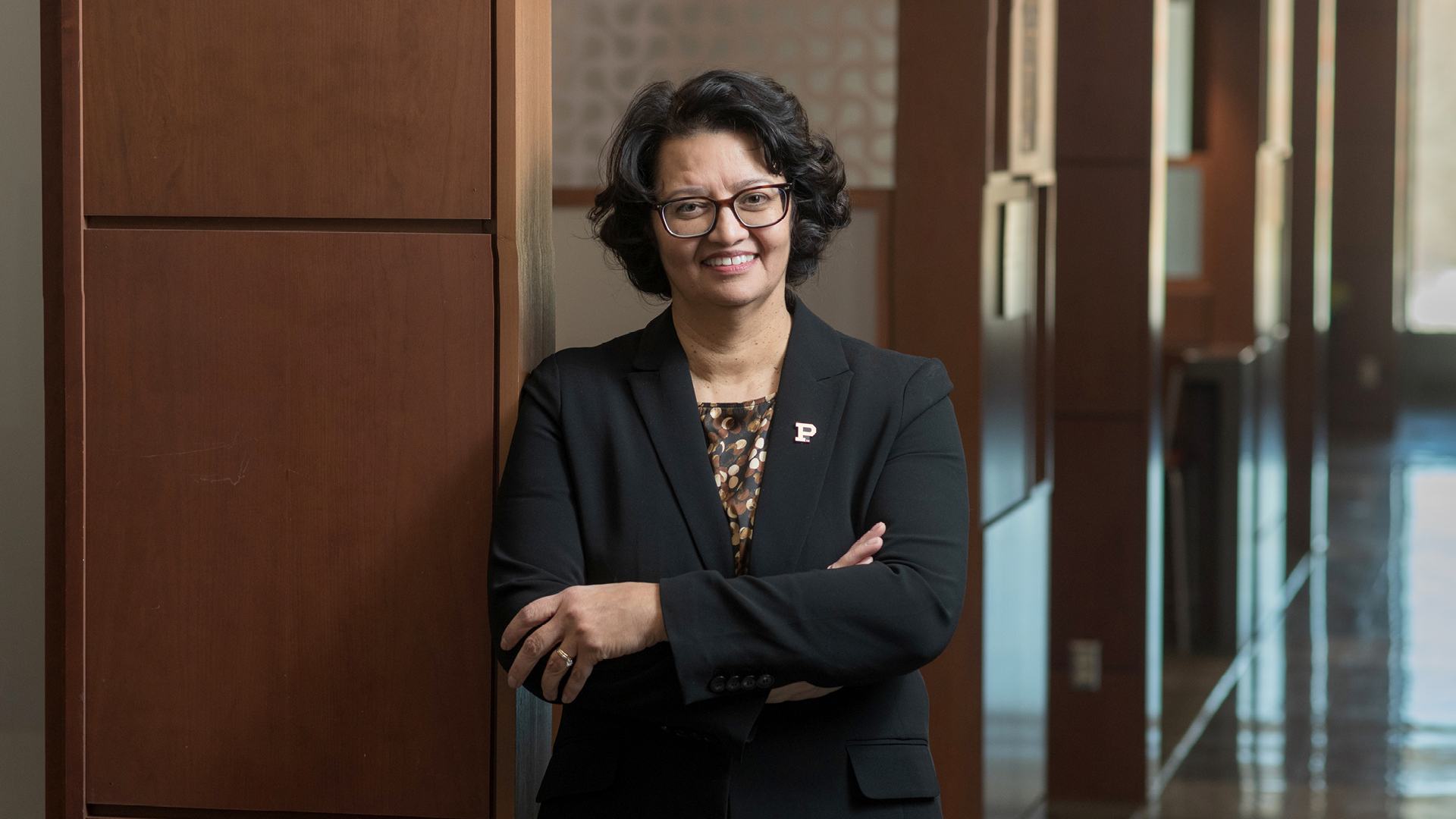Podcast Ep. 79: From Purdue to President of Pizza Hut: In-Depth With David Graves
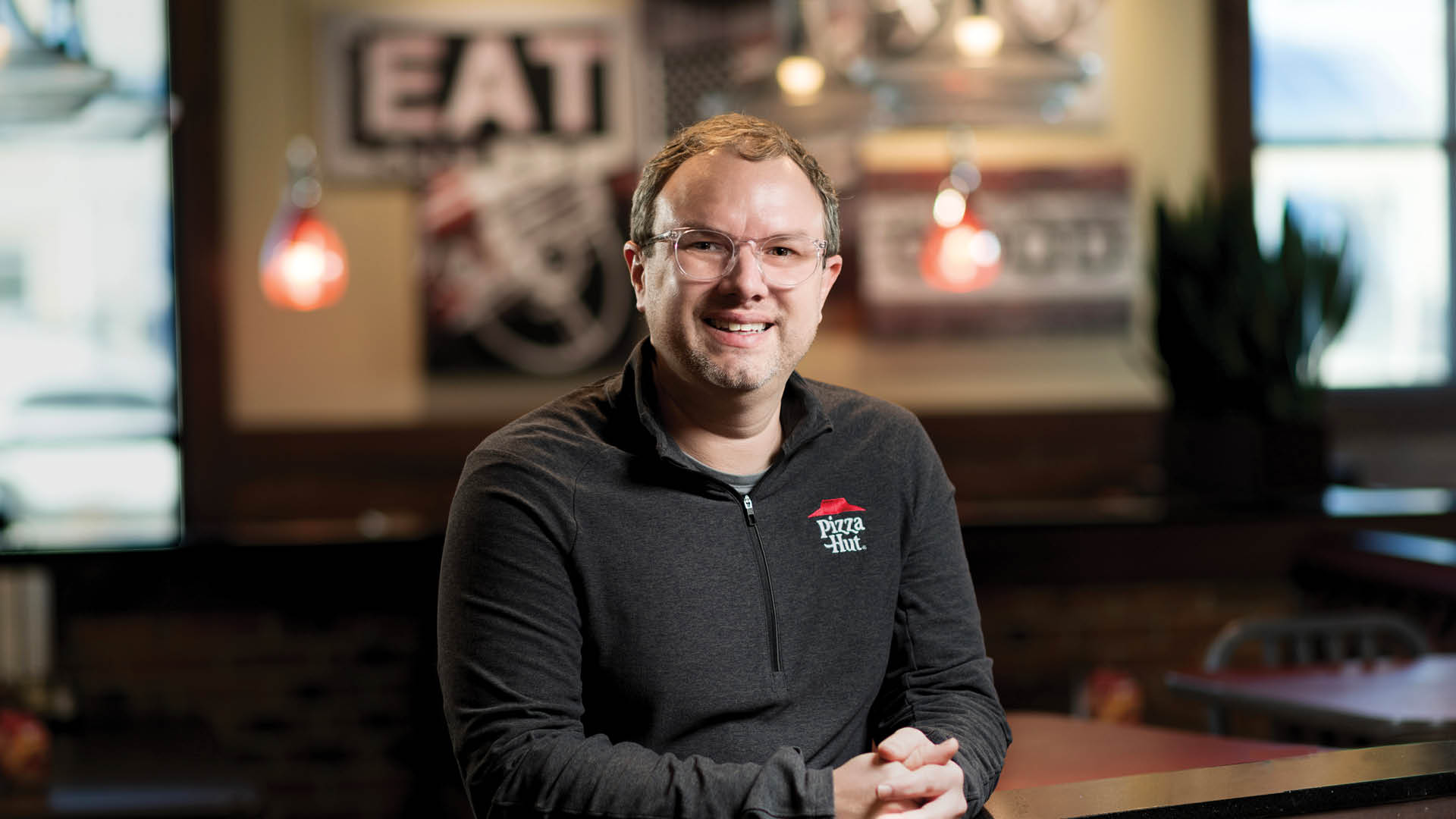
In this special episode of “This Is Purdue,” we’re talking to the president of Pizza Hut U.S., David Graves.
That’s right, the president of one of America’s largest pizza chains is a Boilermaker who graduated from Purdue University’s business school, newly named after President Emeritus Mitch Daniels.
Listen as David (BS management ’03) describes how Purdue prepared him with the persistence and perseverance needed to innovate global brands such as Pampers, Pantene and several Yum! Brands, including Kentucky Fried Chicken (KFC) and Pizza Hut.
You’ll hear about some of David’s favorite advertising and marketing initiatives over the years, including working with actor Craig Robinson of “The Office” and using Pizza Hut’s brand nostalgia to bring its marketing into today’s modern age.
Plus, David shares some of his favorite memories at Purdue – including how he met his wife – and his love for Purdue Athletics. And you don’t want to miss hearing our podcast team go behind the scenes in a Pizza Hut kitchen to make his go-to pizza order.
This episode shares the success story of a Boilermaker who celebrates Purdue’s innovation, excellence and community.
- Learn more about David here
- Learn more about Purdue University’s new Mitchell E. Daniels, Jr. School of Business
- Learn more about Pizza Hut here
Full Podcast Episode Transcript
David Graves:
This is David Graves, president of Pizza Hut, and you’re listening to, This Is Purdue.
Kate Young:
Hi, I’m Kate Young and you are listening to This Is Purdue, the official podcast for Purdue University. As a Purdue alum and Indiana native I know firsthand about the family of students and professors who are in it together, persistently pursuing and relentlessly rethinking who are the next game changers, difference makers, ceiling breakers, innovators, who are these Boilermakers? Join me as we feature students, faculty and alumni, taking small steps toward their giant leaps and inspiring others to do the same.
David Graves:
Why am I proud to be a Boilermaker? It’s an incredible place that prepares incredible leaders and you look at the types of things that have been accomplished by Boilermakers all over the world. To be able to be a part of that community is really a privilege.
Kate Young:
This is an age old question. Does pineapple belong on pizza?
David Graves:
Of course, if you like it, it belongs on pizza.
Kate Young:
I like that rule.
Kate Young:
In this episode of This is Purdue, we’re talking to the president of Pizza Hut US, David Graves. That’s right. The president of one of America’s largest pizza chains is a Boilermaker. Now, if you’re a regular listener of This is Purdue you know we’ve done a few hands-on episodes in the past. From visiting chemistry teacher Phil Cook and his lab at Culver Academies to checking out IndyCar engineer Angela Ashmore at the Indianapolis Motor Speedway. We love seeing our guests work in action, and if you’re new to this podcast, welcome, you are in for treat because for this special episode, the team went to meet David in his element too, right inside a Pizza Hut. The wonderful staff at the Pizza Hut location in Lebanon, Indiana graciously invited us to shoot this interview first thing in the morning ahead of opening for their lunch crowd. So not only did we get to chat with the president of Pizza Hut US, we also got to watch him in action helping to make his favorite pizza back in the kitchen.
And you better believe the podcast team got to sample some of those delicious pies, after the interview of course. In this episode you’ll hear David discuss how Purdue prepared him with the persistence and perseverance needed to innovate global brands such as Pampers, Pantene, Kentucky Fried Chicken and Pizza Hut. You’ll also hear about some of David’s favorite advertising and marketing initiatives over the years, including working with actor Craig Robinson of The Office and using Pizza Huts brand nostalgia to bring its marketing into today’s modern age. So let’s jump right in to hear more background on David’s Purdue journey. David, thank you so much for joining us on, This is Purdue, we’re thrilled to have you, thrilled to be in a Pizza Hut.
David Graves:
Yeah, thanks Kate. It’s great to be here and honestly it’s an honor to be here with you, so I appreciate you guys inviting me.
Kate Young:
Oh my gosh, we’re so excited to feature you, your story. Tell us a little bit about your background first, when did you first hear about Purdue University?
David Graves:
So I grew up in Kokomo, Indiana, so not really that far from here. I think it’s that direction. So I grew up in Kokomo, Indiana. I think if you grow up in Indiana you sort of, it’s hard for me to tell you when I first heard about Purdue. It was just part of me right from when I was a child. I guess everyone grows up connected type, the Boilers or The Hoosiers. And so I grew up a Boilermaker, but we lived in Kokomo. We could go over to Purdue and had a lot of friends who had gone there. I used to go over to Elliott for the Christmas show every year and visit friends there. And so it just was kind of part of me and then as I was going through high school, it was like basketball and Jean Katie and Glen Robinson and so I just fell in love, fell in love with the school from an early age.
Kate Young:
Were you always interested in business school? How did you decide to finally come to Purdue when it was that time?
David Graves:
Yeah, no, it’s really interesting. Not business at all actually. So I came to Purdue actually to be a engineer.
Kate Young:
Oh.
David Graves:
You weren’t expecting that word?
Kate Young:
No, I wasn’t.
David Graves:
So I came to Purdue to be an engineer. I was this kid who loved math and science and was really curious and I liked solving hard problems so engineering felt like the right thing to do for me. So I remember visiting campus, I’d visited a few different places and walking around the campus at the time and it was a beautiful place. And I actually remember going to the freshman engineering building, I don’t know if it’s still called the freshman engineering building, but right there by the clock tower. And I met with a counselor and we were talking about everything I could do at Purdue and engineering and I was like all in on coming to Purdue and being an engineer. So I came to Purdue to be an engineer. It was my process at Purdue that frankly got me interested in business.
So through that process and I was interning in the automotive industry and doing some different things after a couple years of engineering actually came back to Purdue and decided actually think I want to do a business role. And I remember thinking, “Oh man, I’m going to change my major and how’s this all going to work?” But I went into the business school and then ultimately graduated with a degree from Krannert and some focus on finance and marketing. And so that’s what I’ve been doing, but was not the plan when I started. And honestly I should say it’s one of the things I felt really blessed as I was at Purdue was just the people and the way that they invested in me and it was such a big place, but I felt really cared for and I was able actually to just pivot from being an engineering and getting an amazing education engineering to getting an amazing education in business all in the same place and I felt really blessed and lucky to be able to do that.
Kate Young:
Yeah, absolutely. I know Purdue is a big place, but we always hear from guests that it felt like home right away and it really is that community feel there.
David Graves:
It really did. And I tell people no, I have two nephews that are at Purdue now and I remember when they were looking at schools and said, “It’s a big place, but you find this community, you build the best friends, the best relationships and it feels really close and intimate when you’re there.” And that was exactly how it was for me. I still have a ton of friends from actually my freshman dorm when I was at Purdue.
Kate Young:
David shared some of his favorite memories at Purdue, including how he met his wife and his love for Purdue athletics, plus what he remembers about the community of professors and others who invested in him during his time in college. Tell us about one of your favorite stories or memories.
David Graves:
Oh gosh, there’s so many. So sports were big for me when I was there. I was at Purdue during Drew Brees. I don’t think I realized how lucky I was at that point in time. So I was like, “We always win.” We were winning and going to bowl games every year and I have this memory of, I don’t know what year it was, it’s probably must have been ’99 or 2000, but I can just remember being in the student section at Ross-Ade and we were playing Ohio State and it was like we were coming back and Drew Brees throwing it deep to Seth Morales… I’m not sure. And the whole stadium just erupting. We won. And I just remember thinking, “Man, this is awesome. This is really special.” So that was incredibly fun. I mentioned, I should say I met my wife in Shreve Hall in the mail room, so I don’t know if there’s still a male room in Shreve Hall, but we’ve been married for 20 years now or almost 20 years. We have two kids, but we met at Purdue our freshman year.
Kate Young:
Tell us the story of how you met.
David Graves:
We were in Shreve Hall. There’s a mail room, you go to get your mail. I was there with some of my friends and she was coming down to get her mail and we just met there and then we started, we had some common friends and so we started hanging out and then over time we started dating and then we got married shortly after we graduated from Purdue and we were living in Cincinnati for a while and now we have two beautiful kids and we live in Dallas and been married almost 20 years.
Kate Young:
And you said you guys still root for the Boilermakers, you’re watching all the games recently.
David Graves:
Absolutely, absolutely. It’s tough to watch them all because there’s a ton, but we try and watch them all. Love watching basketball, football, and interestingly, I think wherever you go in this world, and this is something I’ve found having lived in a lot of places is there’s a Boilermaker community. So it was that way for us in Cincinnati, when we lived in Singapore it was that way, when we were on the West Coast, now we’re in Dallas and we always find a Boilermaker community everywhere we go.
Kate Young:
We’ve heard that before in this podcast too.
David Graves:
Yeah, it’s part of what makes Purdue really special.
Kate Young:
It is, it is. So were there any special classes that you remember, any professors that really stuck out to you during your time?
David Graves:
To me it was really about the collective. And so yeah, I have certain classes that I loved, but it was just the collective of people that invested in me along the way. And so it wasn’t any individual that certain counselors that helped me think about, hey, what classes should I be taking? How do I really continue to grow towards my goals? And being able to be the access that I had to the professors when I was struggling with something or when I needed help and just the way that they invested in me personally. I felt really cared for during my time at Purdue and just I really knew people were investing in me. It gives you this, “Hey I’ve got to give back and invest in the same way now,” and I think that’s part of what makes the community so special.
Kate Young:
So after graduating from Purdue, what came next for David? As you’ll hear he kicked off his early career working on some incredible global brands.
David Graves:
So I graduated from Purdue, I went to Procter & Gamble. It was interesting. I think I said earlier I had this just natural curiosity was probably why I went to be in engineering in the first place. I loved hard problems and I was curious and I wanted to solve problems, but then I really loved the people side of what I was able to do through Krannert. And so I met some folks on campus actually who were recruiting from Procter & Gamble. I was looking just as most of them had graduated from Purdue and I was looking at what they were doing and I’m like, man, that’s interesting. I want to do that. I think that would be really fun and so luckily I was able to get a job at Procter & Gamble. So I went there and I started really in a role where I was focused on understanding customers and why do customers do what they do and then how do we build brands and solve problems for them, which was incredibly fun and it was a great time.
Kate Young:
So you transitioned into the restaurant world. Were you always interested in the food and dining experience? What led to that?
David Graves:
I think everybody loves food. I love food. We’re in a restaurant. Think about I’m blessed and sell pizza. When you talk to people, I tell people, “Hey, I sell pizza.” I have a 11-year-old daughter and her friends come over and they think that that I work at pizza is the coolest thing and we talk about new pizzas that could come out. So everybody loves food and I’m no different. I love cooking. I have a bad habit of collecting cookbooks and reading them like real books. I think my wife would like me to have a few less cookbooks. Really for me I had been at Procter & Gamble for a while. I was starting to think about doing something different and this opportunity came up back in the Midwest at KFC and which is this iconic brand that I had grown up with and it was like this opportunity to go reimagine this brand.
I just thought that sounds cool, that’s really fun and I love food, let’s go for it. And so that’s how I ended up coming into the restaurant industry. What I’ll say that I don’t think I appreciated fully at the time is the restaurant industry, everybody loves food, lots of people that come into the restaurant industry they love food, but it’s really a people industry. You have this incredible opportunity to impact people both through giving them delicious food and connecting people through the joy of food, but also building careers and developing people. When you talk to people that are in the restaurant industry and they’ve been there for a long time, the thing that you’ll find is the thing that keeps people there is really the people. And it’s a people industry and frankly that’s what makes it a lot of fun because you can connect with people, impact people and build incredible relationships.
Kate Young:
David’s right, most people love food, including me. I love the connection you feel going to a restaurant to catch up with friends or having a fancy date night to celebrate something big. And most people out there love pizza. There’s usually so many memories tied to pizza too when you really think about it. Childhood birthday parties, going out for a good report card, late nights in college, and then much earlier nights in adulthood when you simply just don’t feel like cooking. As I mentioned previously in this episode, our This is Purdue podcast team had the chance to go behind the scenes in this Lebanon Pizza Hut kitchen with David himself.
David Graves:
Should we go back and check these things out?
Kate Young:
Yes!
Pizza Hut Employee:
We got a large half cheese pie coming out top. We’ve got a large ham and of course Hawaiian down here, that’s yours, there you go. Pineapple belongs on pizza.
David Graves:
I agree.
Kate Young:
I agree.
Pizza Hut Employee:
Oh, there’s a big New Yorker coming out. And then I heard this one is your personal favorite with the pepperoni, the jalapeno and lots of cheese for him.
David Graves:
Look at it when it comes to here. See, this is why you got to get it right out of the oven. You see it’s golden?
Kate Young:
Oh my goodness.
Okay. A little background on Pizza Hut. In 1958, two brothers borrowed $600 from their mom to open a pizza place in Wichita, Kansas. They named it Pizza Hut because their sign only had room for eight letters. Today, this iconic pizza brand has more than 16,000 restaurants and 350,000 team members in more than 100 countries. David had the team try a few different pies, including the 16 inch New York style pizza, the Big New Yorker, which recently returned to their menu after its initial launch 24 years ago from thin crust to hand tossed to the iconic pan crust to new innovations like their Pizza Hut melts, a cheesy crispy melt loaded with toppings, paired with a dipping sauce. Our team had the chance to sample quite a bit, and by the way, we were eating these delicious creations at around 10:00 AM but nobody seemed to mind.
David Graves:
It’s 10:20 in the morning, it’s probably the earliest you’ve ever eaten pizza.
Kate Young:
Amazing.
David Graves:
I’m going to try this one too because we just launched this yesterday.
Kate Young:
Oh is this the New Yorker?
David Graves:
The people are loving it, but I haven’t been home, so I haven’t tried one from a store yet.
Kate Young:
Look at how big that piece is. Now, all of it was delicious, but when I had a bite of that simple classic cheese pan pizza, the memories came flooding back. Does anyone remember Pizza Huts BOOK IT! program from elementary school? I sure do. The BOOK IT! program is the nation’s longest running corporate supported literacy program and impacts more than 14 million students each year. So what’s the crust difference between when we’re looking at all these?
David Graves:
So this is a hand tossed, like a hand stretched, hand tossed dough. So thin crust is obviously a really thin crispy crust. So this is stretched by hand to this size. So this is a 16 inch pizza that they stretched and then that’s Pan dough. So Pan dough is proof dough that raises, so they put it in a proofer, it raises overnight, and then that’s how you get this big Pan dough.
Kate Young:
This reminds me of childhood.
David Graves:
Yeah, this is like the iconic Pizza Hut pizza. Yeah. But what people don’t know is that that and Personal Pan Pizzas through Book It! But the Thin crust is the original pizza that started the very first Pizza Hut in Wichita that the Carney brothers started on was a thin crust pizza.
Kate Young:
Can you almost just taste that Pan Pizza? Our whole team agreed. You just can’t be Pizza Huts original Pan Pizza. I asked David how he manages to incorporate that old school red roof feel of the Pizza Huts of the past into today’s modern era. You’re talking about branding and marketing obviously. So when we think about Pizza Hut, there’s so many memories, especially growing up in Indiana that I have of the old school Pizza Huts. After a ballgame or for a good report card, we come here. What is it balancing that nostalgia and then also trying to bring the brand into this modern day era.
David Graves:
You’re right, if I ask anybody, tell me about a memory you have at Pizza Hut. Everybody has a memory. It’s always a positive memory. So it’s exactly what you said, “Oh, I went there and I celebrated this game,” or “They had a pizza party.” What other food has a party named after it? Yeah. So there’s all these positive memories, but I think the thing is, anytime you work on a brand and you’re trying to balance, that’s what you want. You want a brand that connects with people in a really positive way, the joy and the warmth of a brand, but then how do you really bring that forward in a modern way? And so to me it’s always like you got to go back to what makes that brand really special. So it’s interesting, when I came to Pizza Hut, the first thing I did was I actually went to Wichita, which is where the first Pizza Hut was.
And I met with some of the original franchisees, the founder of Pizza Hut. We went to the Pizza Hut Museum. When this brand was at its best when people loved this brand and were really what makes it tick, what makes it loved, and it was great food, it’s hospitality, it’s innovation, it’s like being in culture, doing interesting things in culture.
And so you’d want to take those elements and then be like, how do you do that in a modern way? And so that’s what we’ve tried to do at Pizza Hut and to me that’s about how do you take those latent memories that everybody has but then bring them into today? And so you see things like, hey, what’s an arcade and a Pizza Hut look like today? Well we launch a PAC-MAN arcade game but AR on the box? Or what does it look like to pick up pizza today? We do a pickup lane on a Pizza Hut, but we will connect it through the app. So it’s in the digital ecosystem. So to me that’s all about how do you just take the things that make it really special, that make people love it, but make sure that those are really relevant and modern today.
Kate Young:
And when you think back on your career and especially with the Pizza Hut brand, is there a favorite ad that you worked on that’s super memorable to you?
David Graves:
Yeah, it’s like asking me to pick a favorite child. So I’ve been really blessed to work on a lot of amazing brands. I love some of the Colonel work we did at KFC. I think that was really fun. We did a really fun launch of chicken and waffles, which was a Colonel ad that rift on dirty dancing and that was really fun. It had an impact on the business too.
I got to launch my first Super Bowl app when I was at KFC, which was really fun, more stressful than I thought it would be, but really fun. But frankly, I’m real proud of the work that the team has done on Pizza Hut over the last couple years. The team has really taken all of the things that make Pizza Hut special that you see in this restaurant or any restaurant. We all think about the Red Roof and no one out pizzas the Hut and just the experience of Pizza Hut and put it all on the screen with the joy and warmth of the brand. And that’s continuing to evolve as we go forward. My experience has been in any marketing campaign that you do, you kind of land this core idea and then you kind of build from there. And that’s what I’m seeing with that Pizza Hut campaign is it’s moving in a really exciting way that takes everything that’s special about Pizza Hut, but puts it in a really modern setting. So I’m really proud of that work and I’m excited to see where it goes next to be honest.
Kate Young:
And I know a lot of people think The Office is one of the most iconic TV shows of all time, and you guys are using Craig Robinson in your ads. How did that idea come up?
David Graves:
So Craig, which is just, he’s a great guy and really fun to work with and it’s a funny story about how that came about. We were thinking about we want to create a marketing campaign that really celebrates that joy that you feel when you get pizza. And we wanted to bring all the things onto the screen that were special about Pizza Hut so that you would know it was a Pizza Hut ad.
And so when the agency wrote the campaign, we were looking at different campaigns. We had this campaign we called the Spirit of the Hut, what ultimately became this the campaign you’re talking about. And we were looking at that campaign and we’re like, “Hey, we need the central character. We need somebody like a Craig Robinson like character.” And I remember that conversation and then someone said, “Why don’t we just get Craig Robinson?” And then he was interested and so that’s how it came. But really it was about him and who he was and the joy and the warmth and the fun that he brings to everything that he does. And the fact that he could represent that on screen for Pizza Hut is how that came about. It’s been great and he’s been really fun to work with through that whole campaign.
Kate Young:
I love that. Why use someone like Craig Robinson when you can just ask Craig Robinson himself. While we were on the topic of brands, I had to ask David about his thoughts on his alma maters brand. So when we talk about brands, Purdue’s brand is iconic, not only in Indiana, but across the world really. What do you think the brand stands for now it’s almost 155 years old?
David Graves:
Yeah, that’s a tough one. I think anytime you think about a brand and what it stands for, you got to pull back and be like, “How does it differentiate?” And for me, Purdue is all about innovation. We were talking before we started about the campus, and I think about what it was like when I was there and then I think about what it’s like, I haven’t been there recently, but in the last year or so. But it’s always innovating. There’s always new things coming and the students are doing new things and the faculty are doing new things, so it’s always continuously improving and innovating. So I think that’s a big part of the Purdue brand. Community is a big part of the Purdue brand. It doesn’t matter where I go in the world. I can remember I had moved back in, I don’t know, around 2011, 2012, I’d moved to Singapore.
I was somewhere walking in Singapore and I had on a Purdue T-shirt and someone yelled Boiler up at me and it’s like, it doesn’t matter where you go. There’s this community and there’s pride in that community and people rally around that. So I think there’s something really special about that. I don’t know. The last thing for me is just excellence. We talked about tough problems. Purdue has solved a lot of incredible problems and is innovating and solving big things for the world. And I think about just pride and excellence at Purdue and delivering solutions, innovation, community and excellence.
Kate Young:
You aced it.
David Graves:
I get an A.
Kate Young:
Yeah.
David Graves:
All right. That’s good.
Kate Young:
David did ace it. David mentioned the word innovation a few times throughout that last answer as you just heard. And speaking of innovation, Purdue University was recently named one of the world’s most innovative companies ranked by Fast Company Purdue came in at number 16 overall and number one in education for its advances in the vital field of semiconductors and micro electronics. David went on to tell us about a very specific time period when he and his team relied heavily on innovation during the COVID-19 pandemic. He discusses the demand for delivery and how innovation played a huge role in the way Pizza Hut developed new ideas like contactless deliveries during this time of uncertainty. Pizza places are kind of interesting too. You get to come in here and eat with your family and enjoy it, but then you also have the delivery component, the new digital age of ordering on your phone, ordering on your laptop. What was it like during the pandemic? Everyone wanted delivery. We weren’t sure if it was safe to go out and grab it ourselves. What was that navigating that time?
David Graves:
It was tough. It was tough. And I’m really proud of the team and the way they stepped up both in our restaurants and our team of operators and people back at our core because people really came together. And I think what’s important, all of a sudden you’ve got an incredible amount of demand, but also a lot of uncertainty about is it safe and can I interact with another person? And any time that I think you go through a crisis, you just have to have a really clear compass on what it is that’s going to guide your decision making and then you’ve got to run at that. And so for us, you talked about safety. It was all about safety and how do we keep our team members safe and how do we make sure that we’re delivering safe food and how do we make sure that our customers are safe?
We really focused on that and how do we change our operational procedures at the store because we have over 100,000 people working in pizza huts all over the us. How do we change the way we operate at the store so that we can keep people safe? The team really came together quickly and said “People are concerned about interacting with customers and drivers. So let’s build this contactless delivery so that people can feel safe and can get food.” Because what was really apparent during that time is we played a really important role. People didn’t feel safe, they wanted to get food, and you have a lot of joy and comfort that comes from pizza, and so we have an opportunity to serve the communities that we’re in, but we’ve got to do that in a way that makes everyone feel comfortable and makes everyone feel safe.
And so innovation plays a big role in that. Actually, something we did during the pandemic that was really fun is we actually had a team member who worked in a restaurant. He was a delivery driver in Seattle, in Washington. He wrote this letter called Proud to Serve, and it was really all about, I’m proud to serve my local community and the role that he can play, the big role that he can play in serving his community during the pandemic. And so we turned that actually into an ad in the middle of 2020 and ran it, and it was a different ad than what we would’ve normally run, but it was really all about saying thank you to our team members because they were playing such a critical role out on the front lines, serving their communities. But it was tough, but it’s those times where you see the power of a team coming together and what they can do. And so it was a really special time as well.
Kate Young:
I asked David what the word persistence means to him as he’s solving problems and generating new ideas with his Pizza Hut team. As you’re solving these tough problems and everything that you have to go through in your day-to-day, what does persistence mean to you?
David Graves:
Persistence. It’s really important. If I think about persistence, there’s a couple things. One is it is about trying harder. It’s about continually trying, but it’s also about courage and being really focused on the opportunity and not the barriers because a lot of things are hard and you keep coming at them and failing is okay, but you got to stay focused on the opportunity and the end point and what’s possible. And people who are really persistent, I think they find motivation in what’s possible and the opportunity and staying focused there.
And so when things go wrong, that’s okay, because things are hard and they’re going to be hard before you actually solve the problem and they get easier and that’s okay. And just knowing that that’s part of the process that everybody goes through and it’s normal and not letting that discourage you because I think it’s really easy. And I mentioned earlier I feel like I learned a lot about dealing with adversity at Purdue. It’s like you don’t have to be discouraged by that. That’s normal. It’s part of the process and reminding yourself of that and staying focused on the endpoint. And so to me that’s persistence is like you’ve got to have the courage to run it really hard things and stay focused on the opportunity and know that that you can do anything if you keep trying and you are willing to deal with some of the setbacks that come along the way.
Kate Young:
I love that. David touched on courage and handling adversity there and to not be discouraged when it comes to solving these really hard problems that we all run into. Looking back, how has your time at Purdue prepared you to be able to become the president of Pizza Hut? What are the skills and things that you’ve learned along the way that you would credit back to Purdue?
David Graves:
I think when you’re at Purdue, and I mentioned earlier just the investment that you feel in you, I felt that very clearly. I felt really cared for as I was really, it was like I was growing up and figuring out what I wanted to do. I could feel people investing in me and helping steer me through that. That’s a critical skill of how do you do that and how do you coach and develop people in any role that you’re in, whether that’s in business or something else. And so obviously that is there.
I will tell you Purdue was hard, so it was hard. I learned a lot about work ethic and dealing with adversity and realizing at Purdue that if you really focus and you know what you’re going after and you’re focused on an endpoint and you create some discipline around that, that you can do incredible things. I really learned a lot about dealing with adversity there. And I come now into any business setting. There’s very few things that we do that make a huge difference that are easy. They’re hard and things are hard before you start to really see the reward and that they start to get easier. And so I credit Purdue for a lot of that, really giving me the knowledge and understanding that with perseverance and with really discipline, you can move through adversity and achieve incredible things.
Kate Young:
And I’ve read a couple articles where you’ve said, “I really enjoy solving tough problems.” Is there any particular problem that you’ve solved throughout your career that you would want to share?
David Graves:
Look, I do really enjoy solving tough problems because there’s great reward when you solve tough problems. And usually it takes a team to solve tough problems. So when you’re working on something hard, I always say I want to do interesting work with people I like, it’s like you’re on a team and you accomplish something incredible with a team. There’s no better feeling than that.
And I think I wouldn’t pick any particular problem and say that was the toughest one, but I think what I would say is often solving a hard problem is not about just trying harder, it’s about being able to pull back and look at the problem really differently. And so whether that’s like, Hey, I need to do a transformation of our technology, or I need to change a brand, or I need and change the way that we show up in the world. All of those things are about how do we approach this problem really differently and think differently? To me, that’s fun about it is often it’s not about trying harder, it’s about pulling back and creative innovative solutions with a team to solve really big problems. And when you can do that, the rewards are really fun and incredible.
Kate Young:
I know we feel that way about our colleagues and teams within our Purdue, Purdue University family too. I mean, I remember asking our podcast team, but how will we set up a podcast shoot inside of a Pizza Hut? Well, our video team clearly stepped up to the challenge as they always do, and when it comes to that Boilermaker community and Chanley, David says he still feels like a part of it even when he’s 1000 miles away from campus. What does that Purdue spirit and that community mean to you and your wife living in Texas now?
David Graves:
We have a ton of pride about having been at Purdue, met at Purdue. We have nieces and nephews who are attending Purdue, and we have a ton of pride about that and because there’s a lot of reasons to have pride about that, and for us, Purdue was a launching point for our family. It was a launching point for a lot of opportunities. We have a lot of pride in that, and we want to see that from a lot more people. And so when you hear us talk about Purdue, when I was just talking to someone in Texas about it at our school in Texas, a couple weeks ago, it’s like it’s a great place and there’s an incredible opportunity that comes out of that and you’re going to learn and you’re going to grow, and it’s a launching pad, and so that’s what the Boilermaker spirit is to us.
Kate Young:
I asked David why he was proud to be a Boilermaker and who he thinks it when he thinks about his alma mater.
David Graves:
Why am I proud to be a Boilermaker? It’s an incredible place that prepares incredible leaders, and you look at the types of things that have been accomplished by Boilermakers all over the world. To be able to be a part of that community is really a privilege. It’s not about being in Texas. I think it’s about being anywhere. Yeah, but you think about I’m part of an incredible community that’s done incredible things. How can I contribute to that community as well?
Kate Young:
Who do you think of when you think of Purdue?
David Graves:
There’s a lot. I will tell you, I felt really blessed. I got to meet Neil Armstrong when I was at Purdue, and he kind of encompasses just Purdue for me, it’s like I’ve said earlier this idea of just excellence and I remember thinking like, “Man, this guy stood on the moon.” Yeah, I think that he just jumps off the page for me of what the Purdue brand is of excellence, and he was always coming back to Purdue and investing in Purdue, but then also just having the courage and the persistence to do something absolutely incredible.
Kate Young:
We were talking earlier and you told me about another Purdue favorite of ours, Mitch Daniels. Tell us about your time within Old Masters and your experience
David Graves:
With him. I was an Old Masters and Mitch Daniels was part of our Old Masters’ class, and so he would not remember me, but I remember him. Yeah, it was is just incredible. I loved Old Masters. It was really something I got to do. I would encourage any, but like, “Hey, you have all these opportunities at Purdue. Use them. Take them.” The world’s really small. You’re going to be surprised all these people where they show up again in your life. But yeah, Mitch Daniels was in our Old Masters’s class and I got to spend some time with him then. So then to see, and I think at the time he was working at Eli Lilly and then to see him become the president of the university was just really, really cool.
Kate Young:
What’s interesting is that the very day we interviewed David, the news broke that the Purdue University board of trustees approved naming Purdue’s Reimagined Business School after none other than Mitch Daniels. The Mitchell E. Daniels Junior School of Business will prepare tomorrow’s leaders and entrepreneurs grounding them in the hallmarks of a Purdue education, including STEM disciplines and business analytics. The board announced they’re also committed to retaining that Krannert name, which is long associated with this school’s graduate offerings since the naming began for its graduate and executive degree programs within the newly named Daniels School. Okay. Back to the pizza. You didn’t think I’d wrap up this interview without asking an extremely important burning question, did you? Okay, so we have to ask, what is your go-to Pizza Hut order?
David Graves:
My go-to, we have to make some pizzas before we leave here. We’re going to all eat before we get out of here. My go-to Pizza Hut order is a thin and crispy pizza with pepperoni and jalapenos. And I like extra cheese on it too, but you got to eat it right out of the oven, so that’s why we have to make it, and then we’re going to eat it right when it comes out. It’s the best.
Kate Young:
That’s amazing. I can attest to David’s favorite pizza here. It was very delicious.
David Graves:
Really hot.
Kate Young:
The extra cheese. I see what I see what you mean there.
David Graves:
It’s great. I love it.
Kate Young:
It’s delicious. As for my favorite pizza. Well, I gave you a big hint at the beginning of this episode.
Speaker 7:
[inaudible 00:35:35] Hawaiian.
Kate Young:
[inaudible 00:35:38] I know, I know. I love a good Hawaiian pizza and I love pineapple on pizza. Hey. To each their own, and the president of Pizza Hut himself told us all at the beginning of this episode, if you like a certain topping, then it belongs on pizza. We ended our interview with David with a few rapid fire questions. Is there anything else I missed that you want to share with our listeners?
David Graves:
No, just thank you so much. It’s a privilege to be here, and I love that we get a chance to spend some time together. It’s an absolute privilege to be part of the Boilermaker community. There is incredible opportunity out there, so let’s all keep dreaming big and doing big things, and a lot of people have invested in me over the years, and so I just want to say big thanks to all the Boilermakers who have invested in me along the way, and hopefully I can give that gift back as well.
Kate Young:
Okay. We’re going to end with some rapid fire questions.
David Graves:
Okay.
Kate Young:
You won’t be-
David Graves:
This is like the outtakes.
Kate Young:
Yeah, exactly. Favorite building on campus?
David Graves:
Oh, geez. It’s got to be Krannert.
Kate Young:
Do you have any favorite restaurants or snacks that used to eat at Purdue that bring back nostalgia?
David Graves:
Harrys absolutely. That’s just stop there. I’ll just stop there.
Kate Young:
You can expand if you want, but that’s a good short answer.
David Graves:
Yeah. Cheeseburger at Harry’s.
Kate Young:
Okay. Okay. You already said Neil Armstrong’s your favorite Boilermaker.
David Graves:
Maybe Drew Brees too. He made my college much better.
Kate Young:
Okay. Okay. What would you say your next giant leap is?
David Graves:
My next giant leap. Hey, it’s all about Pizza Hut and how do we get Pizza Hut back to number one where it deserves to be. That’s an exciting leap to get after.
Kate Young:
If you want to watch our full video interview with David inside Pizza Hut, head over to our podcast YouTube page, youtube.com/@ThisIsPurdue, and trust me, you don’t want to miss watching all of our behind the scenes videos of this very special pizza party. It’s all on our This Is Purdue YouTube channel. This Is Purdue is hosted and written by me, Kate Young. Our podcast video lead is Ted Schellenberger in collaboration with John Garcia and Bad Boone. With this episode, we have additional assistance from Allie Cheney and Lars Petersdorff.
We’d also like to thank the wonderful employees at the Pizza Hut located at 1707 North Lebanon Street in Lebanon, Indiana. Thank you for having us. Our social media marketing is led by Ashley Shorter. Our lead podcast photographer is John Underwood. Our podcast design is led by Caitlyn Freeville. Our podcast team project manager is Emily Jesulaitis. Our podcast YouTube promotion is managed by Megan Hoskins and Kirsten Vorst, and our podcast research is led by our This Is Purdue intern Sophie Ritz. Thanks for listening to This Is Purdue. For more information on this episode, visit our website at purdue.edu/podcast. There you can head over to your favorite podcast app to subscribe and leave us a review, and as always, Boiler up!
